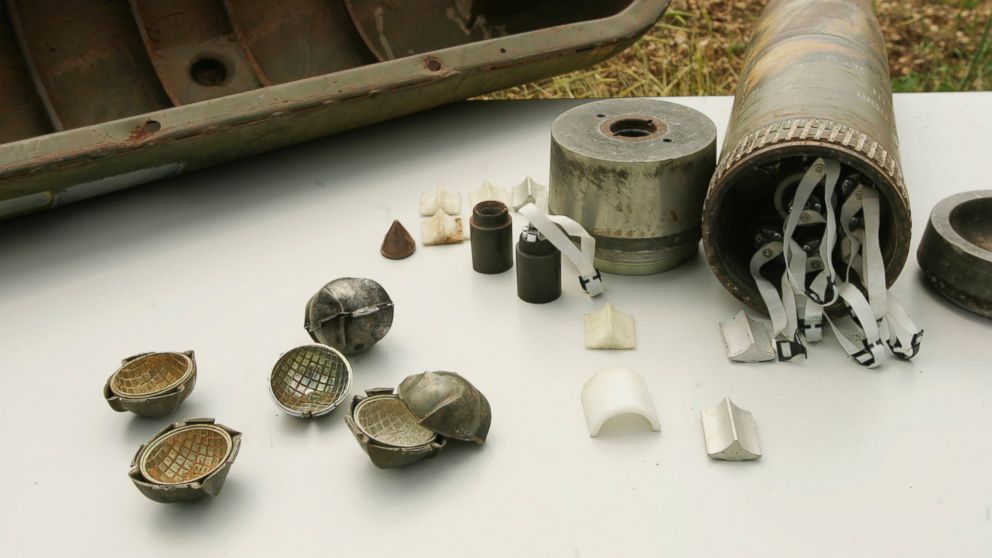House OKs Ongoing Cluster Bomb Sales to Saudi Arabia, Saying a Ban Would 'Stigmatize' the Weapons
Congressman says a ban would "stigmatize" cluster bombs.

— -- Congress has opted to continue selling cluster bombs to Saudi Arabia, citing a need not to "stigmatize" the weapon. But human rights advocates pointed to the close vote, 216 to 204, as progress towards ending the U.S.-Saudi trade of cluster munitions, which advocates say causes indiscriminate carnage.
The House of Representatives voted Thursday against an amendment that would have blocked the transfer of American-made cluster munitions to Saudi Arabia.
Cluster munitions, often called cluster bombs, scatter multiple explosive sub-munitions over a wide area. These sub-munitions, or "bomblets," often fail to explode upon impact and become de facto landmines, continuing to pose a threat even long after conflicts end, according to Human Rights Watch.
Cluster munitions have been used by a Saudi-led coalition in Yemen, in attacks that have targeted large civilian populations, according to the United Nations. In a report titled "Children and Armed Conflict," U.N. Secretary General Ban Ki-Moon blasted the Saudi-led coalition for targeting children.
During the House debate on the proposed amendment on Thursday, Rep. Rodney Frelinghuysen, R-N.J., chairman of the House Committee on Defense Appropriations, noted that the Department of Defense "strongly opposes this amendment."
"They advise us that it would stigmatize cluster munitions, which are legitimate weapons with clear military utility, and are effective weapons, providing distinct advantages against a range of targets, and can result in less collateral damage than unitary weapons," Frelinghuysen said, adding that the U.S. should be encouraging countries to upgrade their cluster munition stockpiles, "rather than making it more difficult for new sales and transfers."
The United States Conference of Catholic Bishops, Human Rights Watch, and Amnesty International all endorsed the amendment, Rep. John Conyers, Jr., D-Michigan, who sponsored the amendment, told his House colleagues on Thursday.
"American-manufactured cluster bombs are currently being used by the Saudi-led coalition that is bombing Yemen. That campaign has caused the deaths of over 900 children, 3,000 civilians, and has forced 2.8 million people from their homes," Conyers said. "In violation of American law, the Saudis have used cluster bombs in civilian areas, endangering innocent civilians and threatening agriculture and other industries in Yemen."
"Since the United States is supplying cluster bombs to the Saudis, and is a member of the coalition led by the Saudis, the United States could be held responsible for careless Saudi actions in this widely criticized bombing campaign," Conyers said.
Cluster bombs were banned by a treaty signed by 119 countries, though a few countries, including the U.S., China and Russia, have not signed the treaty.
Advocates said the small margin by which the amendment was rejected is major progress in an effort to end the cluster bomb trade.
"He is a bit late to try and prevent the stigmatization of this weapon that has been banned by 119 countries," Mary Wareham, advocacy director for the arms division of Human Rights Watch, told ABC News today, responding to Frelinghuysen's statement.
"That vote in the House might have failed but from my perspective it was a big success," Wareham added. "Nearly half of the House of Representatives expressed support for stopping transfers of cluster munitions to Saudi Arabia, which demonstrates concern at civilian harm caused by the weapons, as well as a respect for the emerging international norm."
Sunjeev Bery, advocacy director for Amnesty International's Middle East and North Africa regions, echoed the sentiments of Wareham.
"It was an extraordinarily close vote. Nearly half of the U.S. House of Representatives are ready to cut off cluster bombs to Saudi Arabia," Bery told ABC News today, noting that the timing of this vote is especially significant, as this is the week that President Obama is meeting with Saudi officials.
Bery said the vote is a message that more than 200 House members "find the Saudi Arabian military conduct to be unacceptable."




